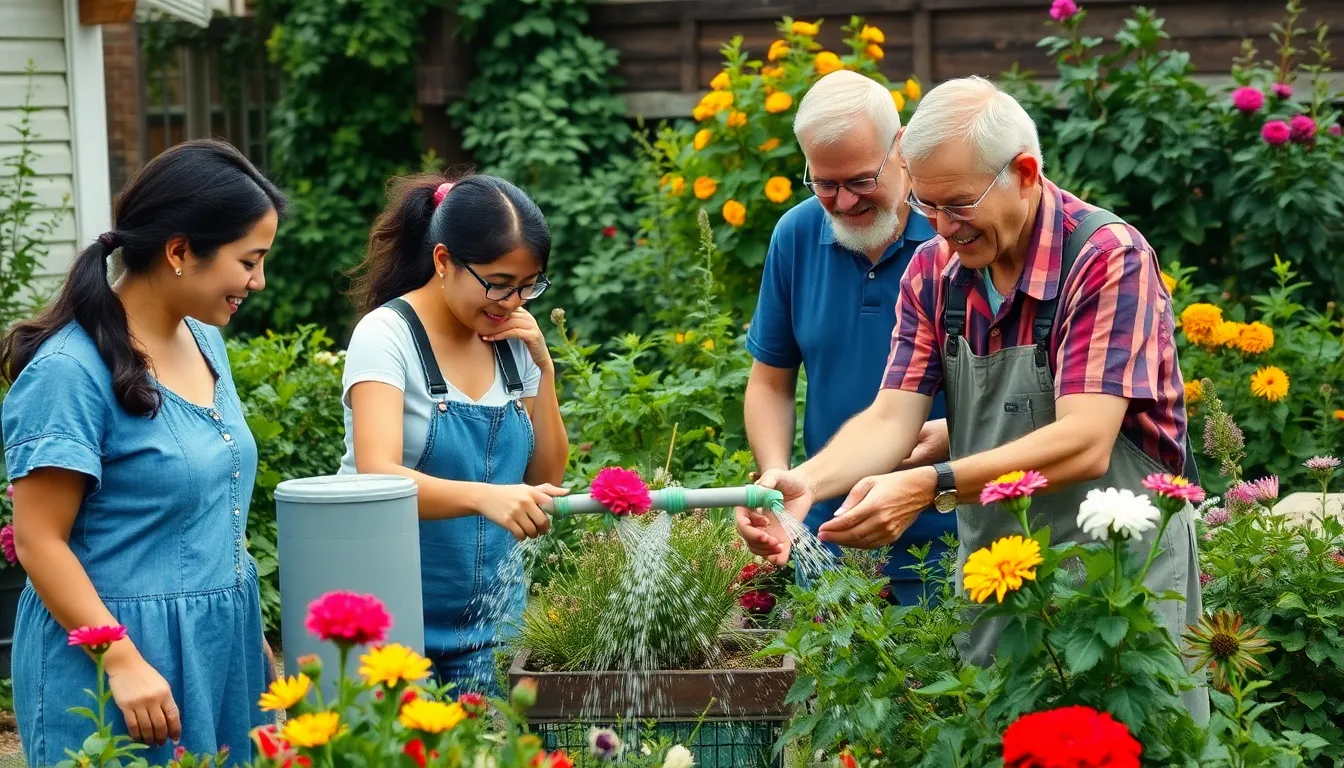Table of Contents
ToggleWater is life, but it’s also a precious resource that’s often taken for granted. Imagine turning on the tap and nothing comes out—panic sets in, right? With climate change and population growth, it’s time to treat water like the celebrity it is. By conserving water, not only can folks save the planet, but they can also save some serious cash on their utility bills.
Importance Of Water Conservation
Water conservation plays a crucial role in ensuring the sustainability of this vital resource. It not only safeguards the environment but also offers significant economic advantages.
Environmental Impact
Water conservation helps protect ecosystems, ensuring the survival of plant and animal species. It reduces the strain on freshwater resources, contributing to healthier rivers and lakes. Maintaining water levels supports aquatic life and preserves biodiversity. Less water extraction leads to decreased soil erosion and improved water quality. Implementing water-saving practices can mitigate the effects of climate change by promoting efficient use. Efforts to conserve water lessen the impact of droughts, preserving habitats during dry periods.
Economic Benefits
Water conservation leads to reduced utility bills for households and businesses. Saving water decreases treatment and distribution costs, benefiting local governments and taxpayers. Efficient usage of water resources allows communities to reallocate funds to essential services. Many businesses experience lower operational costs due to reduced water usage. Investments in water-saving technologies often result in long-term financial returns. Overall, conserving water directly correlates to financial savings at both individual and community levels.
Techniques For Water Conservation

Effective water conservation techniques benefit the environment and reduce costs for households and businesses. Implementing sustainable practices remains essential for ensuring water availability.
Household Practices
Installing low-flow fixtures reduces water usage in bathrooms and kitchens. Collecting rainwater for gardening minimizes reliance on municipal supplies. Utilizing a broom instead of a hose for cleaning driveways conserves significant amounts of water. Regularly checking for leaks helps maintain plumbing efficiency. Running dishwashers and washing machines only with full loads maximizes use, minimizing unnecessary water waste.
Agricultural Methods
Drip irrigation systems deliver water directly to plant roots, enhancing efficiency. Mulching around plants retains moisture, reducing the need for frequent watering. Utilizing drought-resistant crops can significantly lessen irrigation demands. Implementing crop rotation promotes healthy soil, which retains moisture effectively. Monitoring soil moisture levels allows precise watering schedules, preventing overuse.
Challenges In Water Conservation
Water conservation faces several significant obstacles. Understanding these challenges is critical to developing effective strategies.
Climate Change Effects
Climate change drastically impacts water availability. Increased temperatures lead to higher evaporation rates, reducing water supplies. Droughts, which occur more frequently and with greater intensity, strain already limited resources. Additionally, alterations in precipitation patterns create uncertainty about water supply. Regions that once depended on consistent rainfall might experience prolonged dry periods. Overall, climate change exacerbates existing water scarcity issues.
Policy and Awareness Issues
Policy gaps hinder effective water conservation efforts. Many regions lack comprehensive strategies for managing water resources. Insufficient regulations contribute to over-extraction and waste. Awareness of water conservation’s importance is often low among communities, leading to poor practices. Educational initiatives can bridge this gap, promoting efficient water use. Furthermore, governmental support is crucial in enforcing sustainable practices. Collaboration among stakeholders can enhance awareness and instill a culture of conservation.
Success Stories In Water Conservation
Water conservation success stories highlight effective efforts made globally and locally to promote responsible water use.
Global Initiatives
Numerous countries have launched successful campaigns to enhance water conservation. The United Nations implemented the “Water for Life” decade, promoting sustainable water practices through education and outreach. Various nations have adopted policy frameworks aimed at improving water use efficiency, such as Israel’s advanced drip irrigation technology, which has increased agricultural productivity while conserving water. Sustainable development goals emphasize an international commitment to ensuring access to clean water and sanitation for all by 2030. These global initiatives demonstrate a concerted effort to address water scarcity and promote stewardship of this essential resource.
Local Community Efforts
Local communities also implement innovative solutions for water conservation. In California, the “Save Our Water” campaign encourages residents to adopt water-saving practices, resulting in a statewide reduction of over 20% in urban water usage. Neighborhood groups in cities across the U.S. organize rain garden installations, which capture and filter stormwater, enriching local ecosystems while retaining valuable water. The city of Cape Town’s “Water Saving Hero” program engaged citizens in proactive water-use reduction during a severe drought, showcasing resilience through community action. These community-focused initiatives exemplify how grassroots efforts can effectively contribute to broader water conservation goals.
Water conservation is not just a personal responsibility; it’s a collective imperative. By adopting sustainable practices and promoting awareness, communities can significantly mitigate the challenges posed by climate change and resource scarcity. Each small effort contributes to a larger movement towards a more sustainable future.
The benefits of conserving water extend beyond environmental protection. They also encompass financial savings for households and communities, allowing for better allocation of resources. Success stories from around the world show that with collaboration and commitment, it’s possible to make meaningful progress in water conservation.
Embracing these practices today ensures that future generations will have access to this vital resource. It’s time to act and make water conservation a priority in everyday life.







